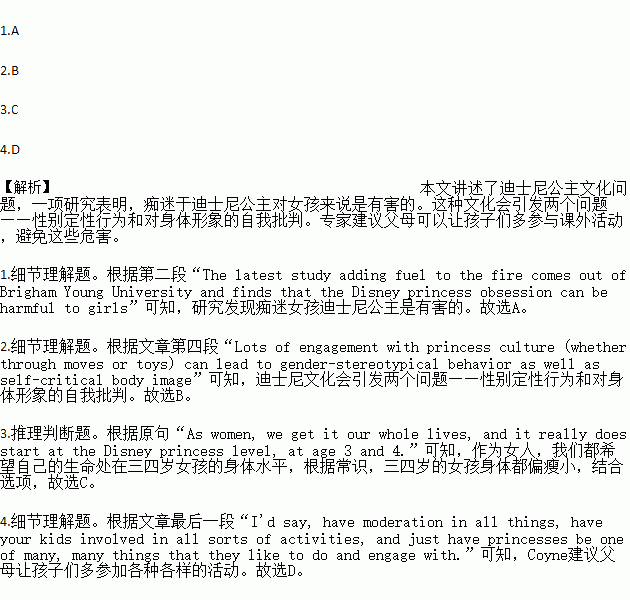题目内容
If you've not heard that the decade-old princess-culture is causing problems—especially if you're a parent—you must be actively working to avoid it.
The latest study adding fuel to the fire comes out of Brigham Young University and finds that the Disney princess obsession can be harmful to girls.
“I think parents think that the Disney princess culture is safe. That’s the word I hear time and time again—it’s safe.” Lead study author Sarah M. Coyne of the Mormon institution in Utah noted in a press release. “But if we’re fully jumping in here and really embracing (accepting) it, parents should really consider the long-term impact of the princess culture."
So, what’s the problem this time around? Same as always, confirmed the study, published in the journal Child Development, which involved the assessment of 198 preschoolers: Lots of engagement with princess culture (whether through moves or toys) can lead to gender-stereotypical(性别定性) behavior as well as self-critical body image.
The strict gender stereotypes can hold girls back. “They feel like they can’t do some things,” Coyne said, “They’re not as confident that they can do well in math and science. They don’t like getting dirty, so they’re less likely to try and experiment with things.”
On the other hand, “Disney princesses represent some of the first examples of exposure to the thin ideal,” Coyne said. “As women, we get it our whole lives, and it really does start at the Disney princess level, at age 3 and 4.”
So, what should a parent do? Try his or her best to avoid all princesses for the entire of a girl's childhood? I'd say, have moderation in all things, have your kids involved in all sorts of activities, and just have princesses be one of many, many things that they like to do and engage with." Coyne suggested. “This study has changed the way I talk to my daughter, the things I focus on, and it's been really good for me as a parent to learn from this study,” Coyne said. “I usually can't say that my research findings have such a personal impact on my life."
1.What do we know about the study?
A. It proved that the Disney princess obsession is harmful.
B. Sarah M. Coyne is the first one to do the research.
C. It started a heated discussion among people.
D. It suggested watching TV programmes of I lie Disney is safe.
2.How many problems can the Disney princess culture cause according to the study?
A. One. B. Two. C. Three. D. Four.
3.What does the underlined word "it" in Paragraph 6 refer to?
A. The Disney princess culture.
B. The idea that girls can't do some things.
C. The idea that girls should be thin.
D. The problem the Disney culture causes.
4.What advice does Coyne give to parents?
A. Actively work on the old princess culture.
B. Change their way they talk to their daughter.
C. Avoid girls to watch any princesses.
D. Have girls involved in all kinds of activities.
 名校课堂系列答案
名校课堂系列答案| A. | recognizing | B. | being recognized | ||
| C. | having recognized | D. | having been recognized |


